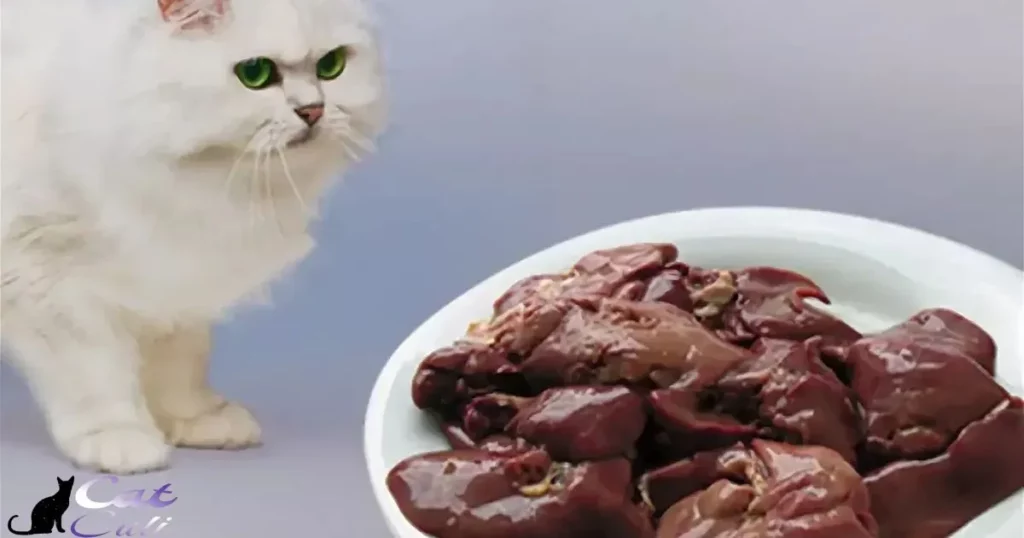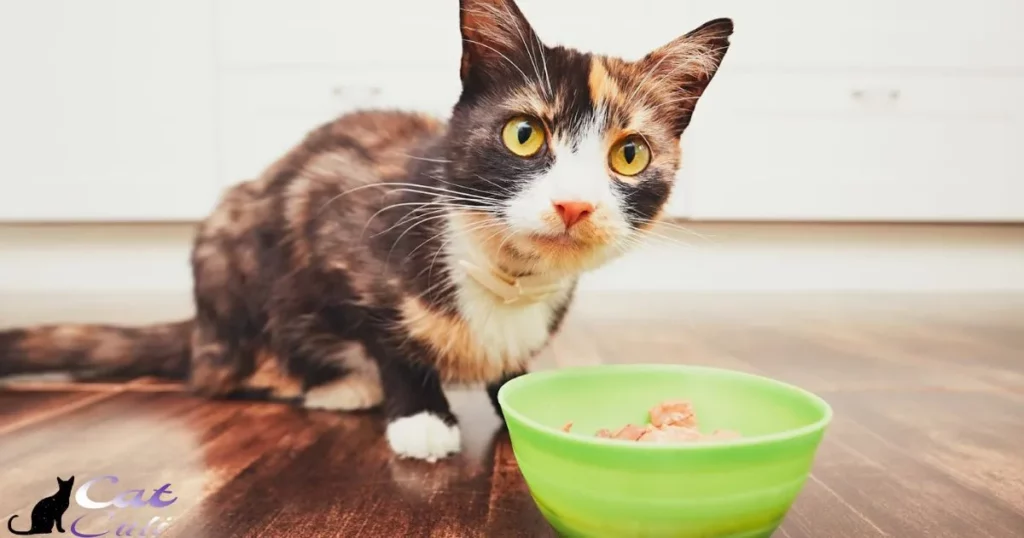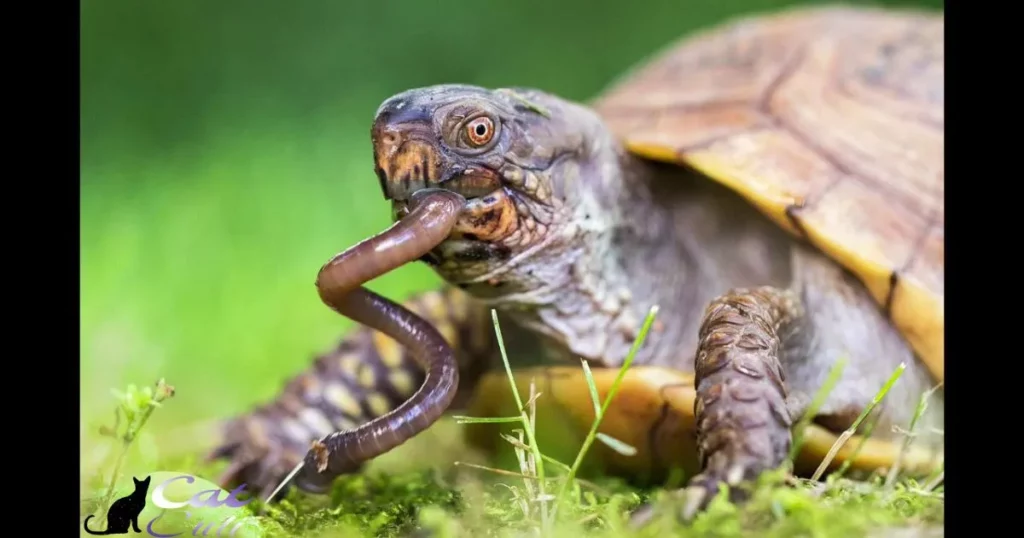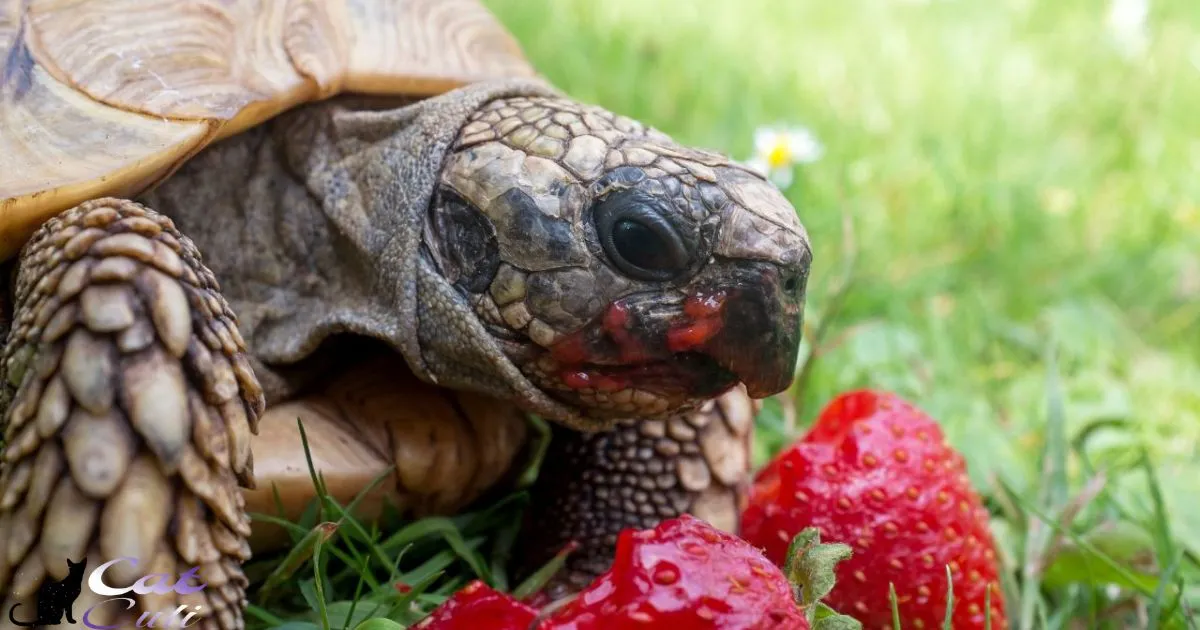Turtles can eat cat food occasionally, but it shouldn’t be their main diet. Cat food lacks essential nutrients turtles need. Offering cat food as a treat occasionally won’t harm turtles, but a balanced diet of leafy greens, vegetables, and pellets is vital for their health. Always consult a vet for the best dietary recommendations for your pet turtle.
The answer might surprise you. While turtles can nibble on cat food occasionally, there’s more to this question than meets the eye. Delve into the surprising facts behind turtles and cat food to uncover what’s safe, what’s not, and how to ensure your shelled companion gets the best nutrition possible.
Exploring whether turtles can munch on cat food? While turtles might sample cat food occasionally, it’s not ideal for their primary diet. Cat food lacks crucial nutrients turtles need for their well-being. Stick around to discover the dos and don’ts of feeding cat food to turtles and learn how to provide them with a balanced, turtle-friendly diet.
What Is in Cat Food?
Cat food contains various ingredients such as meat, poultry, or fish byproducts, along with grains, vitamins, and minerals. Manufacturers often include fillers like corn or wheat, which contribute to the food’s texture and bulk.
These formulations aim to provide a balanced diet for cats, offering essential nutrients like protein, fats, carbohydrates, and vitamins crucial for feline health.Different types of cat food exist, including dry kibble, wet canned food, and specialized diets catering to specific health needs.
The ingredients vary based on the brand and the food’s intended purpose, ensuring cats receive a well-rounded nutritional profile. Understanding what goes into cat food helps pet owners make informed choices about their cat’s diet and overall health.
Cat Diet vs. Turtle Diet: How Do They Differ?
Cat diets mainly consist of protein-rich foods like meat and fish, suited to their carnivorous nature. On the other hand, turtles thrive on a varied diet including leafy greens, vegetables, and sometimes insects or small fish. Cats rely on ready-made cat food while turtles benefit from a mix of fresh vegetables, fruits, and specialized turtle pellets.
The difference in diets stems from their distinct digestive systems. Cats need high-protein diets for energy, while turtles require a more herbivorous diet to maintain their health. Understanding these distinctions helps ensure both pets receive the nutrients essential for their well-being.
The 4 Reasons Why You Should NOT Feed Cat Food to Your Turtle
Feeding cat food to your turtle isn’t a great idea. It lacks essential nutrients vital for your turtle’s health. Cat food doesn’t meet the nutritional requirements that turtles need to thrive. Excessive consumption of cat food can lead to health issues like shell deformities or organ problems in turtles.
It’s important to note these risks before considering cat food for your turtle.Cat food may contain preservatives and additives unsuitable for turtles. These additives might upset your turtle’s digestive system or even cause long-term health complications.
Relying on cat food as a staple diet for turtles can result in imbalances, affecting their growth and overall well-being. It’s crucial to opt for a diet specifically formulated for turtles to ensure they receive the nutrients necessary for their healthy development.
Different Dietary and Nutritional Requirements
Turtles have specific dietary needs that differ from cats. They require a diet rich in vegetables, leafy greens, and sometimes supplemented with pellets formulated for turtles. These foods provide essential vitamins and minerals crucial for their growth and health.
Cat Food Has Too Much Protein
Skunks Eat Cat Food, but it’s important to note that cat food’s high protein content isn’t suitable for turtles. Excessive protein can lead to health issues like shell deformities or kidney problems. Turtles need a balanced diet with sufficient, not excessive, protein for their well-being.
Cat Food Has Too Much Fat
Similarly, cat food tends to have a higher fat content than what is suitable for turtles. Too much fat in their diet can lead to obesity and related health complications in turtles. Their diet should include a minimal amount of fat to maintain good health.
Filler Foods
Cat food often includes filler ingredients that lack nutritional value for turtles. These fillers can upset a turtle’s digestive system and may not provide the essential nutrients necessary for their growth and well-being. Opting for a diet specifically designed for turtles ensures they receive the right balance of nutrients without unnecessary fillers.
Is Cat Food Toxic to Turtles?
Cat food isn’t necessarily toxic to turtles, but it’s not their best meal choice. Some cat food ingredients might lack essential nutrients for turtles, affecting their health. Feeding cat food occasionally won’t harm turtles, but a diet rich in leafy greens, vegetables, and specific turtle food ensures their well-being.
It’s crucial to note that while cat food isn’t inherently toxic to turtles, it’s not an optimal dietary staple. Turtles thrive on a balanced diet consisting of foods specifically designed for them, such as pellets, leafy greens, and vegetables. Ensuring turtles receive the right nutrition is key to their longevity and overall health.
My Turtle Ate Cat Food, What Should I Do?

If your turtle ate cat food, monitor it for any signs of distress like vomiting or lethargy. Ensure fresh water is available, but avoid feeding more cat food. Offer regular turtle food like leafy greens or pellets as usual. If worried, consulting a vet is wise for tailored advice and to ensure your turtle stays healthy.
To prevent accidental consumption, store cat food away from the turtle’s habitat. Regularly check for any spills or open containers accessible to the turtle. Keeping their food separate reduces the chance of them eating something unsuitable and helps maintain their health and vitality.
What Should You Feed Your Turtle
Feeding your turtle right is crucial. Offer a mix of leafy greens like kale, lettuce, and collard greens. Supplement with veggies like carrots and squash for variety. Pellets specifically designed for turtles can be a staple too, ensuring they get essential nutrients. Remember, a balanced diet is key to keeping your turtle healthy and happy.
Small turtles often prefer insects like crickets or mealworms as occasional treats. Larger turtles may enjoy fish or small portions of lean meats. Ensure fresh water is always available for drinking and swimming. They love to stay hydrated! Ultimately, a varied diet supports their well-being and longevity.
What to feed your turtle instead
If you’re considering alternatives to cat food for your turtle, opt for a diet rich in leafy greens like kale, spinach, and lettuce. Veggies such as carrots and bell peppers are also great options. Supplement their diet with turtle pellets specifically designed to meet their nutritional needs.
Ensuring a balanced diet with these foods will contribute to your turtle’s health and vitality.Apart from vegetables and pellets, consider feeding your turtle small portions of fruits like strawberries or bananas occasionally.
These fruits can offer additional vitamins and minerals. Moderation is key when introducing fruits, as excessive sugar intake can be harmful to your turtle’s health. With a diet centred around greens, veggies, pellets, and occasional fruit treats, you’ll keep your turtle healthy and happy.
If you HAVE to feed your turtle cat food
When you must feed your turtle cat food, remember it’s not their ideal meal. Cat food lacks essential nutrients for turtles, so it should only be an occasional treat. Always ensure it’s free from additives like flavourings or preservatives that can harm your turtle’s health.
Opt for a balanced diet of veggies, greens, and turtle-specific pellets as their main food source for a healthy, thriving pet. While feeding your turtle cat food might happen in a pinch, it’s crucial to know it’s not their go-to meal.
Supplementing their diet with occasional cat food is alright, but make sure it’s a small part of their overall nutrition. A varied diet including vegetables, leafy greens, and specially formulated turtle food ensures your pet gets all the nutrients they need to stay happy and healthy.
Nutritional Needs of Turtles Versus Cats
Turtles and cats have different nutritional needs. Cats need a diet high in protein, sourced mainly from meat. On the other hand, turtles are more herbivorous, requiring a diet rich in vegetables, leafy greens, and sometimes supplemented with protein.
This means cat food might not provide the necessary nutrients turtles require for their overall health.Understanding these differences is crucial for pet owners. Feeding turtles cat food could lack essential nutrients like calcium and vitamin D3, vital for their shell and bone health.
Cats wouldn’t thrive on a turtle’s diet, as their bodies aren’t adapted to process the same foods. It’s essential to offer each pet the specific nutrients they need for a healthy, balanced life.
Turtle Nutrition
Turtles primarily need a diet rich in leafy greens, vegetables, and sometimes supplemented with commercial turtle pellets. They also require calcium and vitamin D3 for healthy shell and bone development. Avoid feeding them too much protein, as they are primarily herbivores.
Feline Nutrition
Cats are obligate carnivores, needing a diet high in animal-based protein. They require essential amino acids like taurine and certain vitamins that are found in meat-based diets. Balanced cat food provides the necessary nutrients for their growth, energy, and overall well-being.
Problems With Cat Food

Cat food poses issues when used as the main diet for non-feline pets. It lacks essential nutrients crucial for the well-being of animals like turtles or dogs. This can lead to deficiencies and health problems in these pets. Relying solely on cat food might cause digestive issues due to its composition, affecting the overall health of non-cat pets.
Another problem with cat food is its high protein content, unsuitable for certain animals like turtles. Excessive protein intake can strain their kidneys and result in health complications. Cat food often contains additives and preservatives, potentially causing allergic reactions or other health issues in pets that aren’t cats.
The Best Diet for Turtles
Turtles thrive on a diverse diet consisting of leafy greens, veggies, and occasional fruits. Providing a mix of foods ensures they get essential nutrients for growth and health. Offer pellets designed specifically for turtles to supplement their diet with added vitamins and minerals. Variety is key in crafting the best diet to keep your turtle happy and healthy.
Avoid overfeeding and stick to a routine; turtles can be picky eaters. Fresh, clean water is crucial for hydration and digestion, so ensure a constant supply in their habitat. Consulting a vet for specific dietary recommendations based on your turtle’s species can ensure a well-rounded and optimal diet for your pet.
Can Red-Eared Sliders Eat Cat Food
Red-eared sliders can eat cat food occasionally, but it shouldn’t be their main meal. Cat food lacks essential nutrients crucial for their health. These turtles thrive on a balanced diet of leafy greens, insects, and pellets specially formulated for them. Always prioritize their specific dietary needs for a healthy, happy pet.
Feeding red-eared sliders to cat food occasionally may not harm them, but it’s important to focus on providing a varied diet. Ensure your sliders get the nutrients they need by offering a mix of vegetables, protein sources, and commercial turtle food. Consulting a vet for tailored dietary advice can help maintain your pets’ well-being.
Can Turtles Eat Bread
Turtles can eat bread, but it’s not the healthiest choice for them. Bread lacks essential nutrients that turtles need to stay healthy. Feeding bread to turtles too often can lead to health issues, so it’s best to offer it as an occasional treat rather than a regular part of their diet.
Opting for healthier options like leafy greens, vegetables, and commercial turtle pellets ensures your turtle gets the necessary nutrients. These foods provide a balanced diet that supports their growth and overall well-being. Moderation is key when considering bread as a snack for your pet turtle.
Can Water Turtles Eat Dog Food
Water turtles shouldn’t regularly eat dog food as it doesn’t meet their nutritional needs. Dog food lacks essential vitamins and minerals crucial for a turtle’s health. Feeding dog food occasionally might not harm them, but a balanced diet of aquatic plants, vegetables, and turtle pellets is essential for their well-being.
It’s important to remember that dog food isn’t formulated for turtles and might lead to health issues if relied upon as their main diet. Consulting a vet for proper dietary guidance tailored to your water turtle is crucial for their long-term health and happiness.
Can Turtles Eat Tortoise Pellets
These pellets provide essential nutrients like calcium and vitamins necessary for a turtle’s health. They’re a suitable option for supplementing a turtle’s diet, but remember to offer a variety of foods for a well-rounded meal plan. Incorporating fresh veggies and occasional treats alongside tortoise pellets ensures a balanced diet for your turtle.
Tortoise pellets are formulated with ingredients that cater to the nutritional needs of turtles. Feeding them in moderation as part of a diverse diet contributes to a turtle’s overall health and growth. Always consider combining pellets with other foods like leafy greens and occasional fruits to ensure your turtle gets a diverse and nutritious diet.
What Vegetables Do Turtles Eat
- Leafy greens: Turtles enjoy kale, collard greens, mustard greens, and romaine lettuce.
- Bell peppers: They like red, green, and yellow bell peppers.
- Squash: Turtles relish butternut squash, zucchini, and yellow squash.
- Carrots: A favourite among turtles, both raw and cooked.
- Cucumbers: Sliced cucumbers are a refreshing treat for turtles.
- Green beans: These make a crunchy and nutritious addition to their diet.
- Broccoli: Turtles can munch on broccoli florets occasionally.
- Peas: Fresh or thawed frozen peas are a good source of nutrients for turtles.
- Spinach: Offered in moderation, spinach is another veggie turtles might enjoy.
- Pumpkin: Cooked pumpkin is a seasonal favourite for some turtle species.
What To Feed Wild Turtles

Wild turtles thrive on a natural diet of veggies, fruits, and insects. Offer leafy greens like lettuce, kale, or spinach for their essential nutrients. Supply fruits like berries or melons, and occasionally add insects or worms as protein sources. Remember, a diverse diet is key to their health.
Avoid processed foods or items like bread or dairy because they don’t suit their digestive system. Ensuring a varied, natural diet mirrors their wild eating habits and keeps these remarkable creatures strong and healthy in their natural habitats.
Can Turtles Eat Tortoise Pellets
| Can Turtles Eat Tortoise Pellets? | Information |
| Yes | Turtles can eat tortoise pellets occasionally as part of their diet. |
| Nutritional Content | Tortoise pellets are formulated specifically for tortoises and may lack certain nutrients essential for turtles. |
| Considerations | While turtles can consume tortoise pellets as an occasional treat, it’s crucial to provide them with a balanced diet that includes vegetables, leafy greens, and protein sources. |
| Veterinary Advice | Consulting a vet for dietary recommendations tailored to your turtle’s specific needs is recommended. |
Can Red-Eared Sliders Eat Cat Food
Red-Eared Sliders may nibble on cat food occasionally, but it shouldn’t be a regular part of their diet. Cat food lacks essential nutrients crucial for the health of these turtles. Providing them a balanced diet comprising leafy greens, vegetables, and commercial turtle pellets is vital for their overall well-being.
When considering feeding Red-Eared Sliders, it’s important to avoid relying solely on cat food. While they might eat it sporadically, cat food doesn’t offer the necessary nutrients these turtles need to thrive. Opt for a diverse diet that includes turtle-specific food items to ensure they receive the proper nutrition required for their growth and health.
FAQ’s
What pet food can I give my turtle?
Pellets designed for turtles are best. Also, offer leafy greens, veggies, and occasional fruits as treats for a balanced diet.
Can tortoises eat cat food?
While they might nibble on it, it lacks essential nutrients. A diet designed for tortoises ensures their health and well-being.
What should you not feed turtles?
Avoid feeding them dairy, processed foods, salty snacks, and toxic plants. These can harm their health severely.
Conclusion
In conclusion, the question Can turtles eat cat food? warrants careful consideration. While turtles might dabble in cat food occasionally, it’s not a suitable primary diet.Opting for a balanced diet consisting of leafy greens, vegetables, and specially formulated turtle pellets ensures they receive the necessary vitamins and minerals crucial for their growth.
Understanding the limitations of cat food for turtles underscores the importance of providing them with a diverse and nutritious diet. While a taste of cat food now and then might not harm them, it’s crucial to prioritize foods specifically designed for turtles.








